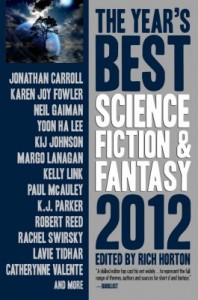“Rampion” by Alexandra Duncan will be appearing in Prime’s forthcoming Year’s Best Science Fiction and Fantasy: 2012 edited by Rich Horton. Pre-order here!
“Rampion” has some elements of the fairytale Rapunzel in it: what about Rapunzel captured your imagination for this?
“Rapunzel” has always been one of my favorite fairy tales. It’s dark and earthy, in the way of a lot of the Grimms’ tales. My mother read a version of it to me when I was four, and I was fascinated by the illustrations of this long-haired woman with a sword who ultimately saves her prince, rather than vice versa. It embedded itself in my imagination.
A few years ago, I was reading Rachel Isadora’s adaptation of the tale to a group of children, and I found myself choking up during the part where the prince falls from the tower. I thought how he would have realized the enormity of his mistake the second before the witch sends him plummeting down into the nest of briars, and the horror he must have felt. I had played around with writing a version of “Rapunzel” from the witch’s perspective before, but all of the sudden, the idea of writing it from the prince’s perspective struck me, and I knew what I wanted to do.
Your story is set at a time of growing religious strife: What lessons do you think carry over from this time period to the present day?
Unfortunately, I don’t think human beings have changed very much in the last millennium. We’re just as fractious, corrupt, and stubborn as we were at the turn of the 11th century, and just as certain that our religion or political philosophy is the only correct one. Part of what I wanted to explore in “Rampion” was the damage fundamentalism can do to individual people and to a culture as a whole. However, I also wanted to discuss what a murky force it is. In my experience, fundamentalism often doesn’t come from one side alone – it’s an accumulation of fear, hate, and confusion from many vantage points, and it eventually grows to the point that it blinds us to the possibility of a third way.
Ishaq has been wounded heavily as a result of his love for Sofia, and while he’s reunited with her, what future do you foresee for him?
I’m a big believer in leaving some loose threads open to the reader’s imagination at the end of a story. I realize this might seem like me dodging the question, but that’s not what I mean to do. There are so many possibilities for Ishaq and Sofia where my story leaves off. Historically, the Cordovan caliph Hisham II, who is Ishaq’s father in this story, was the last in his direct line to rule. Then again, the end of the traditional “Rapunzel” story has Rapunzel healing the prince’s eyes with her tears. What happens next depends on whether you prefer to think of Ishaq’s story as fantasy colored by history, or history colored by fantasy. I hope the story is flexible enough to work in different ways for different people. One of my highest ambitions as a writer is to provide a departure point for other people’s imaginations.
